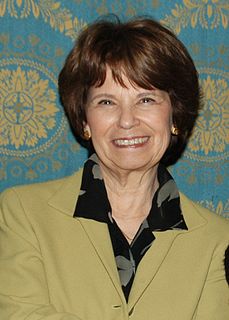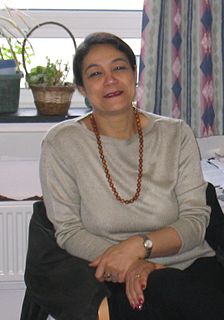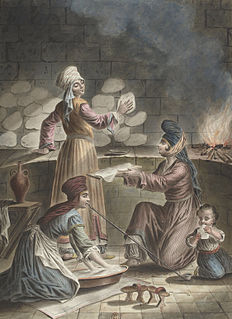
Fatema Mernissi was a Moroccan feminist writer and sociologist.
A combination of Islam and feminism has been advocated as "a feminist discourse and practice articulated within an Islamic paradigm" by Margot Badran in 2002. Islamic feminists ground their arguments in Islam and its teachings, seek the full equality of women and men in the personal and public sphere, and can include non-Muslims in the discourse and debate. Islamic feminism is defined by Islamic scholars as being more radical than secular feminism and as being anchored within the discourse of Islam with the Quran as its central text. As a "school of thought", it is said to refer to Moroccan sociologist "Fatema Mernissi and scholars such as Amina Wadud and Leila Ahmed".

Leila Ahmed ; is an Egyptian-American scholar of Islam. In 1992 she published her book Women and Gender in Islam, which is regarded as a seminal historical analysis of the position of women in Arab Muslim societies. She became the first professor of women's studies in religion at Harvard Divinity School in 1999, and has held the Victor S. Thomas Professor of Divinity chair since 2003. In 2013, Ahmed received the University of Louisville Grawemeyer Award in Religion for her analysis of the "veiling" of Muslim women in the United States, in which she described her rejection of her own previous critiques of the veil as sexist in favor of the view that the veil, when voluntarily chosen, is a progressive and feminist act. As such, she now supports Muslim women who advocate for the veil as a symbol of progressivism and feminism, although Ahmed herself does not practice veiling.
The role of women in Egypt has changed throughout history, from ancient to modern times. From the earliest preserved archaeological records, Egyptian women were considered nearly equal to men in Egyptian society, regardless of marital status.

The Danish Center for Research on Women and Gender (KVINFO) is a center that primarily aims to provide the general public with information about the results of women's studies and gender research undertaken in Denmark and internationally. KVINFO is an abbreviation of the Danish words køn, viden, information, and forskning, meaning gender, knowledge, information, and research.

Aisha E'ismat Taymur was an Egyptian social activist, poet, novelist, and feminist in the Ottoman era. She was active in the early 19th century in the field of women's rights. Her writings came out in a period of time where women in Egypt were realizing that they were being deprived of some of the rights that Islam granted them. Taymur was one of the earliest Arab women to be alive while her poetry and other writings were recognized and published in modern times.
Dr. Jody Miller is a feminist criminology Professor at the School of Criminal Justice at the Rutgers University (Newark). Her education includes: B.S. in journalism from Ohio University, 1989 ; M.A. in sociology from Ohio University, 1990; M.A. in women's studies at Ohio State University, 1991; and her Ph.D. in Sociology from the University of Southern California in 1996. She specializes in feminist theory and qualitative research methods. Her research focuses on gender, crime and victimization, in the context of urban communities, the commercial sex industry, sex tourism, and youth gangs. Dr. Miller has also been elected as the Vice President of the American Society of Criminology for 2015, the Executive Counselor of the American Society of Criminology for 2009–2011, as well as received the University of Missouri-St. Louis Chancellor's Award for Excellence in Service in 2007. Jody Miller is also well known for her ethnographic work during graduate school at a bar called Mac's in the Columbus, Ohio Short North area. While at Mac's she served many pints of ale to future criminologists then studying at The Ohio State University including international idol Ramiro Martinez, Jr.
The Muslim Philanthropy Digital Library (MPDL) is an online project by the American University in Cairo's John D. Gerhart Center for Philanthropy and Civic Engagement and the Center of Excellence for the Middle East and Arab Cultures, AUC Library) and Indiana University, that makes all forms of information on philanthropy available through original documents, reports, graphics, waqf registrations, as well as scholarly analysis in Muslim- majority countries and communities worldwide. Start-up funding for the library in Cairo was provided by The International Development Research Centre of Canada.
Courtney Radsch is an American journalist, author and advocate for freedom of expression. She is the author of Cyberactivism and Citizen Journalism in Egypt: Digital Dissidence and Political Change and worked as the advocacy director for the Committee to Protect Journalists until 2021. She has written and been interviewed extensively about digital activism and social media in the Middle East since 2006.
Hoda Elsadda is Chair in the Study of the Contemporary Arab World at the University of Manchester. She serves as Co-Director of the Centre for the Advanced Study of the Arab World (CASAW) in the UK, Associate Editor of the Online Edition of the Encyclopedia of Women and Islamic Cultures, member of the Board of Directors of the Global Fund for Women, member of the Advisory Board of the Durham Modern Languages Series, and Core Group Member of the Arab Families Working Group. Elsadda is also the Co-founder and current Chairperson of the Board of Trustees of the Women and Memory Forum.

Suad Joseph received her doctorate in Anthropology from Columbia University in 1975. Dr. Joseph is Professor of Anthropology and Women and Gender Studies at the University of California, Davis and in 2009 was President of the Middle East Studies Association of North America. Her research addresses issues of gender; families, children, and youth; sociology of the family; and selfhood, citizenship, and the state in the Middle East, with a focus on her native Lebanon. Her earlier work focused on the politicization of religion in Lebanon. Joseph is the founder of the Middle East Research Group in Anthropology, the founder and coordinator of the Arab Families Working Group, the founder of the Association for Middle East Women's Studies, the general editor of the Encyclopedia of Women and Islamic Cultures, and the founding director of the Middle East/South Asian Studies Program at the University of California at Davis. She is also the founder and facilitator of a six-university consortium of the American University of Beirut, American University in Cairo, Lebanese American University, University of California at Davis, and Birzeit University Consortium.

Barbara Lethem Ibrahim is the founding director of the John D. Gerhart Center for Philanthropy and Civic Engagement at the American University in Cairo. Internationally recognized as a prominent sociologist of the Arab world,

Islah Jad is a tenured Assistant Professor of Gender and Development at Birzeit University. She is also the co-founder and current Director of the Institute of Women’s Studies at Birzeit and a Core Group Member of the Arab Families Working Group. A prominent figure in the Palestinian women’s movement, Jad also helped to establish the Women’s Affair Centre in Gaza and Nablus, Les Amies du Francis, the Child Corner project in el-Bireh, and the WATC. Jad carried out Gender Consultancy for the United Nations Development Programme and was a co-author of the United Nation’s Arab Human Development Report of 2005. She earned a bachelor's degree in political science from Cairo University, a master's degree in political theory from the University of Nantes, and a Ph.D. in gender and development studies from the University of London. In July, 2009 Jad received AMIDEAST’s Teaching Excellence Award.

Female participation and advancement in majority Muslim countries, or nations in which more than 50% of the population identifies as an adherent of the Islamic faith, have traditionally been areas of controversy. Several Western nations, such as the United States and Western Europe, have criticised majority Muslim nations for the lack of involvement and opportunity for women in the private sector.
Al Fatat was an Arabic women's magazine published in Alexandria, Egypt. The magazine was the first Arab women's magazine and was one of the earliest publications in the country. It was published from 1892 to 1894. Al Fatat is the forerunner of the women's magazines in the Arab countries.

Farida Shaheed is a Pakistani sociologist and feminist human rights activist. In 2012, she was appointed the United Nations Special Rapporteur in the field of cultural rights. She heads the Shirkat Gah women's resource centre in Pakistan, and is known for her extensive work on gender and class analysis, both in Pakistan and more globally.
Carrie A. Rentschler is a scholar of feminist media studies and associate professor at McGill University located in Montreal, Quebec, Canada. Rentschler's work focuses on how media produces culture and its effects on women's lives and the reproduction of rape culture. She advocates anti-violence through the production of media to reduce violent crime.
Nay El Rahi is a Lebanese journalist, researcher, activist, and gender advocacy professional from Beirut, Lebanon.
Maya Morsy is an Egyptian political scientist and specialist in public policy and an advocate for Women and Human Rights. She is an elected President of Egypt's National Council for Women (NCW) on 1 February 2016 to Date as the third and the youngest President of the NCW since it was established in 2000. The National Women Machinery of Egypt an independent body by law and constitution reporting to the President of Egypt, since February 2016. Before she was elected to lead the NCW, Morsy served as regional gender team leader for the Regional bureau of United Nations Development Programme in New York and Regional Center in Amman before she served as the Country Manager for the United Nations Development Fund for Women. She has been described as "one of the best public policy experts on social gender in Egypt, and perhaps even in all of the Arab world".
Ateyyat El Abnoudy, also known as Ateyyat Awad Mahmoud Khalil, was an Egyptian journalist, lawyer, actress, producer, and movie director. She was born in a small village along the Nile Delta in Egypt. El-Abnoudy was considered to be one of the pioneering Arab female movie directors as her films inspired the works of many Arab women in the industry. She has been called the "poor people's filmmaker" due to the subject matter that inspired her to make films, including civil rights issues and the condition of impoverished Arabs.








